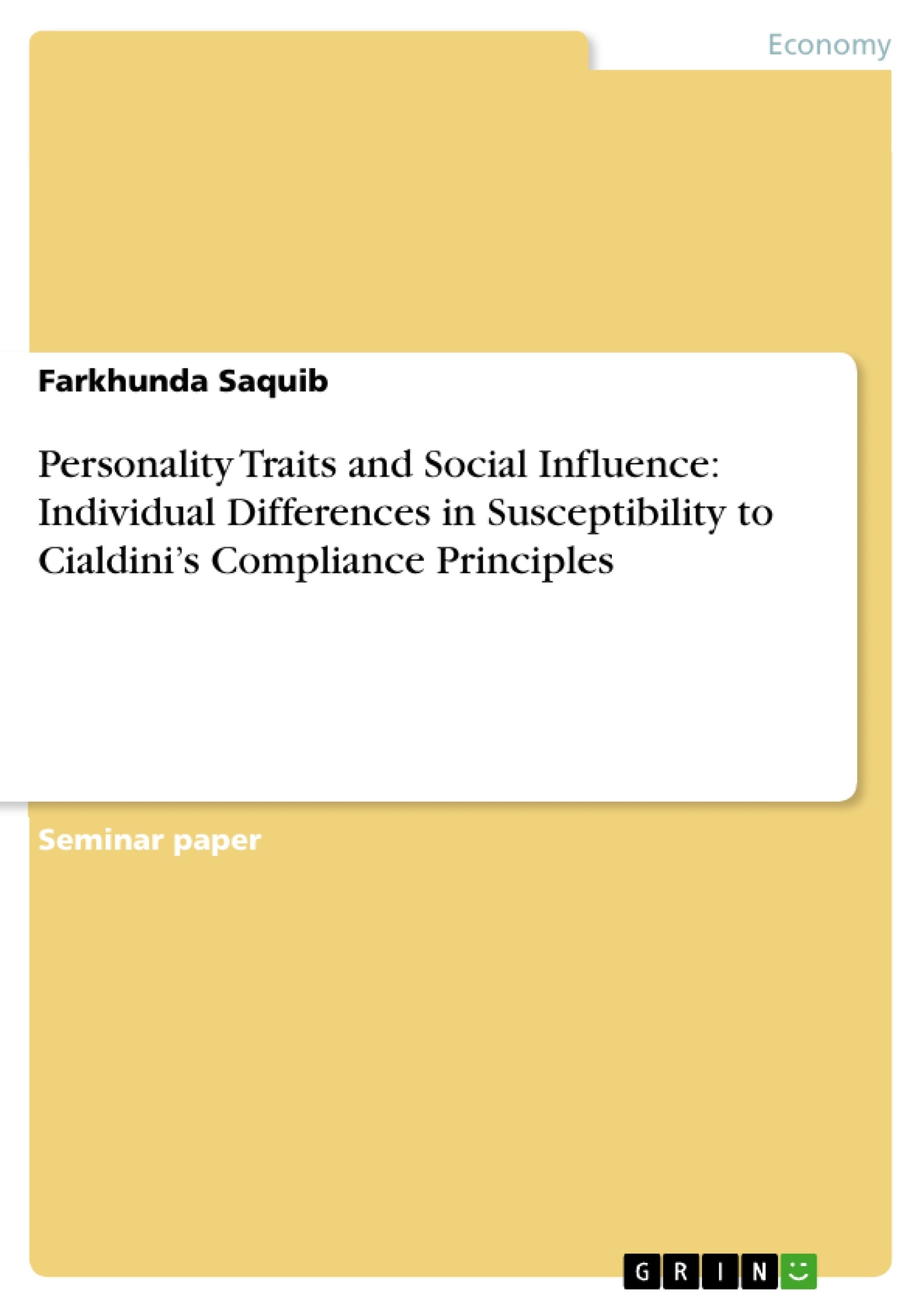Over the previous decades, researches have scrutinized social influence – the methods used for changing people’s attitudes and behaviors. According to Key et. al. (2005), social influence encompasses two forms of influence: persuasion and compliance. While the former refers to alteration of attitudes, the latter denotes change in behavior. Both forms of social influence have been researched (Albarracin et. al., 2005), although the impact of personality differences has mostly been assessed in the context of persuasion, not compliance (Key et. al., 2009).
Marwel and Schmitt in 1960s originally conceived compliance by producing a series of compliance-gaining tactics. Decades later, Robert Cialdini distinguished between six principles through which compliance with persuasive request can be obtained. Compliance according to Robert Cialdini (2001) is the process of getting people to conform to a request. The target complying with the persuasive request may or may not apprehend that he or she is being impelled to act in a particular way (Cialdini & Goldstein, 2004). Jointly Cialdini and Goldstein (2004) define compliance as a submission made in response to a persuasive request.
Research on compliance is significant since it is a form of social influence that affects people’s everyday behavior (e.g. social interaction). This paper infers how responsiveness to Cialdini’s compliance principles varies by personality. Historically, researchers interested in the study of personality differences have mostly relied on the five-factor model (FFM) also referred to as Big Five personality factors (Richard et. al., 2001). Currently, this model is widely used to explain crucial features of personalities among different individuals (Judge et. al., 2002). [...]
Inhaltsverzeichnis (Table of Contents)
- Introduction
- Literature Review and Hypotheses
- Compliance Strategies
- Personality Factors
- Neuroticism
- Extraversion
- Conscientiousness
- Agreeableness
- Intention to Comply
- Methodology
- Sampling
- Measures
- Analysis
Zielsetzung und Themenschwerpunkte (Objectives and Key Themes)
This research investigates the relationship between personality traits and individuals' susceptibility to Cialdini's compliance principles. The study aims to understand how different personality characteristics influence responsiveness to various compliance techniques.
- Compliance Strategies: The study explores the effectiveness of Cialdini's six compliance principles, focusing on authority, liking, consistency, and reciprocity.
- Personality Factors: The study utilizes the Five-Factor Model (FFM) to assess personality traits, including neuroticism, extraversion, conscientiousness, agreeableness, and openness to experience.
- Individual Differences: The research examines how individual differences in personality influence susceptibility to compliance techniques.
- Practical Implications: The study explores the potential applications of the findings for marketers and health promoters in understanding and influencing consumer behavior.
- Social Influence: The research contributes to the understanding of social influence, particularly focusing on the impact of personality on compliance.
Zusammenfassung der Kapitel (Chapter Summaries)
- Introduction: This chapter introduces the concept of social influence, highlighting the distinction between persuasion and compliance. It discusses the significance of compliance research and introduces Cialdini's six compliance principles. The chapter also presents the Five-Factor Model as a framework for understanding personality traits.
- Literature Review and Hypotheses: This chapter provides a detailed overview of Cialdini's compliance principles, specifically focusing on authority, liking, consistency, and reciprocity. It discusses the five-factor model of personality and explores the relationship between specific personality traits (neuroticism, extraversion, conscientiousness, and agreeableness) and susceptibility to compliance strategies.
- Methodology: This chapter outlines the research methodology, including details about the sample selection, the measures used to assess personality and compliance, and the data analysis techniques employed.
Schlüsselwörter (Keywords)
The primary keywords and focus topics of this research include compliance principles, social influence, personality traits, Five-Factor Model, neuroticism, extraversion, conscientiousness, agreeableness, susceptibility, marketing, and health promotion. The study examines the relationship between individual differences in personality and responsiveness to Cialdini's compliance strategies, offering insights into the influence of personality on consumer behavior and social interactions.
Frequently Asked Questions
How do personality traits influence compliance?
The research examines how individual differences, based on the Five-Factor Model, affect a person's susceptibility to various social influence techniques.
What are Cialdini’s six principles of compliance?
Robert Cialdini identified six principles: authority, liking, consistency, reciprocity, scarcity, and social proof, which are used to get people to conform to requests.
What is the difference between persuasion and compliance?
Persuasion refers to the alteration of attitudes, while compliance denotes a change in behavior in response to a direct request.
Which personality model is used in this study?
The study utilizes the Five-Factor Model (FFM), also known as the Big Five, which includes Neuroticism, Extraversion, Conscientiousness, Agreeableness, and Openness.
Why is research on compliance significant for marketing?
Understanding which personality types respond best to specific compliance strategies helps marketers and health promoters tailor their messages more effectively.
What specific traits are linked to compliance in this research?
The paper investigates how traits like Agreeableness, Conscientiousness, and Extraversion correlate with the intention to comply with persuasive requests.
- Citation du texte
- Farkhunda Saquib (Auteur), 2012, Personality Traits and Social Influence: Individual Differences in Susceptibility to Cialdini’s Compliance Principles , Munich, GRIN Verlag, https://www.grin.com/document/202559



